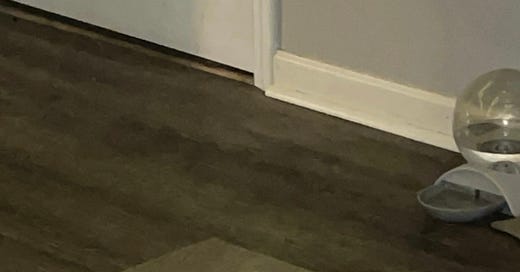The coffeeshop was a familiar liminal space. The kind of place that existed just outside of time—an in-between, neither new nor old, neither full nor empty. The kind of place where you could sit for hours, watching the world shift around you, the people coming and going like ghosts slipping in and out of reality.
I used to spend so much time in places like this, back when I, too, was caught in the in-between. Eighteen to twenty-three—what I like to think of as the forgotten years. The years where I was supposed to be discovering myself but instead felt like I was drifting, running on the auto-pilot expectations of childhood programming.
She had chosen a good one. Quaint, quiet, the air thick with the scent of freshly roasted beans. No one else was here except for the barista, polishing cups behind the counter. That made sense. She always liked hole-in-the-wall places—places she could claim before they got too big, before they outgrew her. And when that inevitably happened, she would leave, grateful rather than bitter.
She was used to things outgrowing her.
I spotted her tucked in the back, at a round table wedged into a booth, facing the door. A habit. I knew she liked to see what was coming. She needed the illusion of control, the comfort of knowing when to brace for impact.
I didn’t mind having my back exposed to the world. I no longer needed to see what was coming—I had faith in the things arriving for me.
She already had a drink in front of her. Black coffee. More than likely her second, judging by the way she tapped her fingers on the wooden table. She wasn’t paying attention, nose buried in a copy of The Buddha’s Guide to Gratitude.
I slid into my seat across from her and checked my watch, worn on my right wrist just like hers.
I had arrived just on time.
She barely glanced up.
“You’re late.”
I smiled, settling in.
“I arrived when I was supposed to.”
She huffed, snapping the book shut and shoving her glasses up her nose.
“That’s typical of you to say,” she muttered. “My mother always said if you’re not thirty minutes early, you’re late.”
I tilted my head. “Your mother is anxious.”
She didn’t argue. Instead, she leaned back, arms crossing. “You enjoying Siddhartha’s teachings?”
“You’re on a first-name basis with the Buddha now?”
“I’m on a first-name basis with lots of esoteric spirits these days.”
The barista set my drink down in front of me. A black tea with honey. I poured a bit of the golden liquid into my cup, stirring clockwise.
She made a face. “Tea? How do you drink that gunk? Black coffee all the way.”
“That’s how Dad drinks it too,” I mused. “But me? I prefer my caffeine to be a smooth rise.”
“What’s that supposed to mean? Tea barely has any energy in it.”
“It has just the right amount for me. The Concerta takes care of the rest.”
Her fingers, still tapping the table, abruptly stopped.
“Concerta?”
I took a sip of my drink, mirroring her movements. “One of the medications I take.”
“For what?”
“My ADHD.”
She tucked a piece of straightened blonde hair behind her ear, earrings glinting. A tell. “The place wasn’t hard to find, was it?”
A deflection.
“No, it was easy. I was just wondering why you reached out at all.”
She hesitated. The first crack in her armor. “I missed you, I guess.” She shrugged, pushing her book into her backpack—overstuffed, like always. “I just wanted to catch up.”
I pulled my pink journal from my chicken-shaped purse.
Her lips twitched. “Pink? I thought you hated that color.”
I smiled, tapping my pen against the cover. “Nah. You hate that color. But pink is transformation. It’s rebirth. We spend a lot of time in that energy these days. Might as well appreciate it.”
She exhaled, something unreadable in her expression. “It’s also associated with Venus.”
Then, softer, “Things have been kind of tough.”
I flipped to a fresh page. “Tough how?”
She hesitated, rubbing at the ring on her thumb. “I just… feel cursed. Like I’m not living up to my family name. When they adopted me, why did they name me after people who don’t even care about me? Or care too much? Everyone has a plan for who I’m supposed to be. I can’t handle the weight of it all.”
I set my pen down. “Why don’t you change it then? Pick a name you can live up to.”
She barked out a laugh, but there was no humor in it. “They’d never let me—”
“That’s what I did. They couldn’t stop me. After I told Mom and Dad, they even drove me to drop off the paperwork. Though, I’m sure that was tough for them.”
She went quiet. A muscle in her jaw tensed.
“How’d you get them on your side?” she finally asked. “My mom would never go for that.”
I sighed. “A lot of arguing. A lot of hard conversations.”
“We’re not speaking right now,” she admitted. “We got into a big fight. It’s been a few months.”
“I can’t imagine that,” I murmured. “I talk to Mom every day. We fought like hell growing up, but…” I trailed off. “Maybe you can make up?”
She shook her head. “Doubtful.”
Keep reading with a 7-day free trial
Subscribe to The Neighborhood Fortuneteller to keep reading this post and get 7 days of free access to the full post archives.




